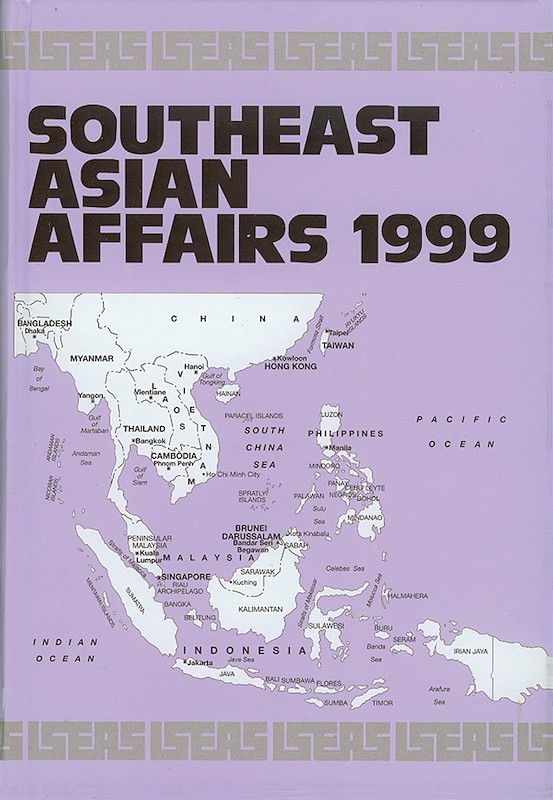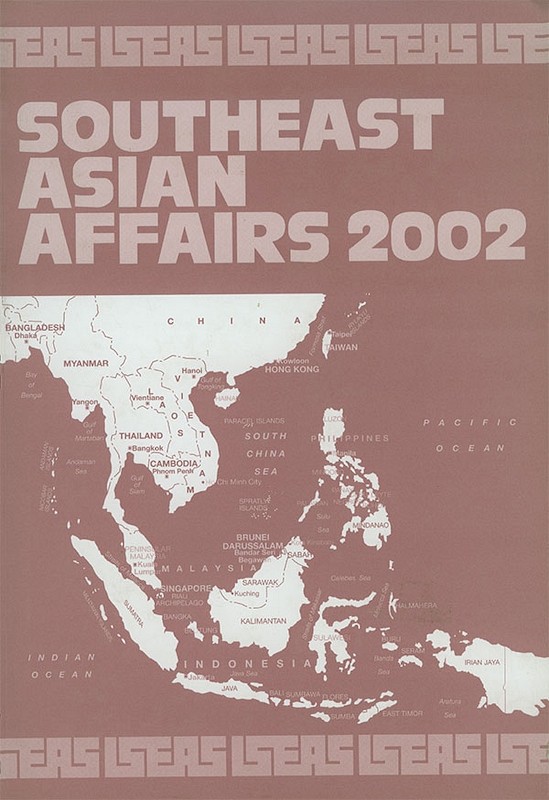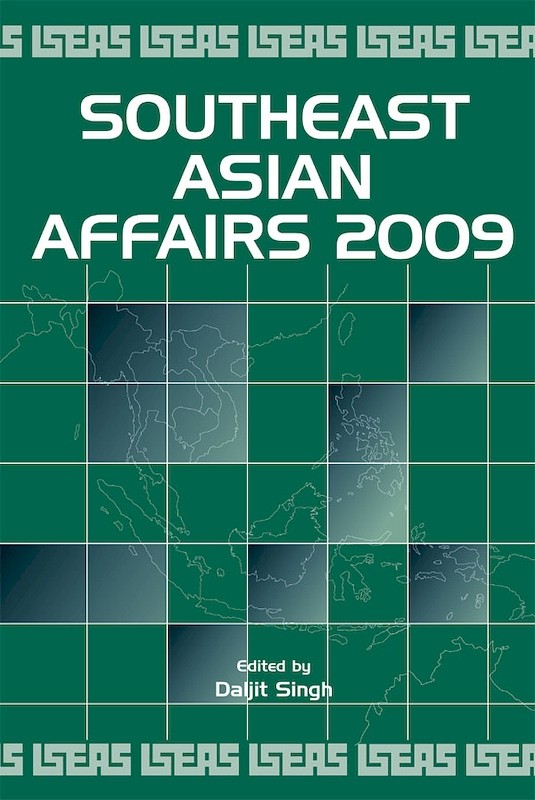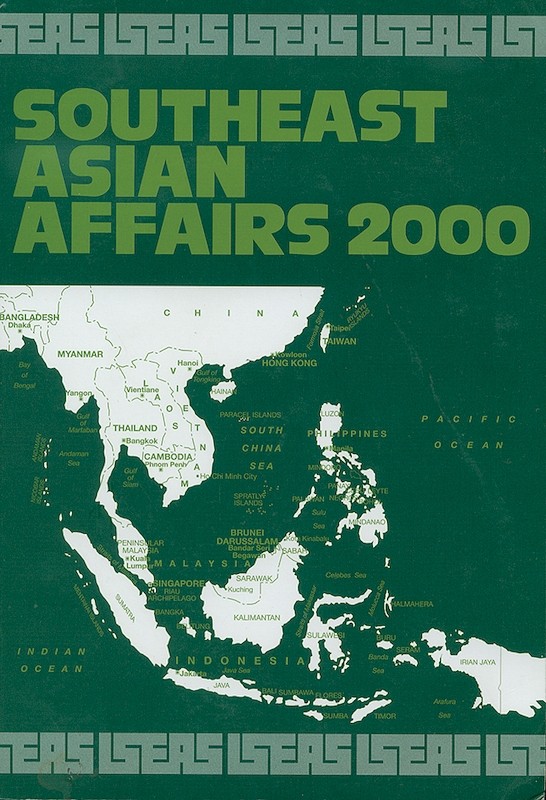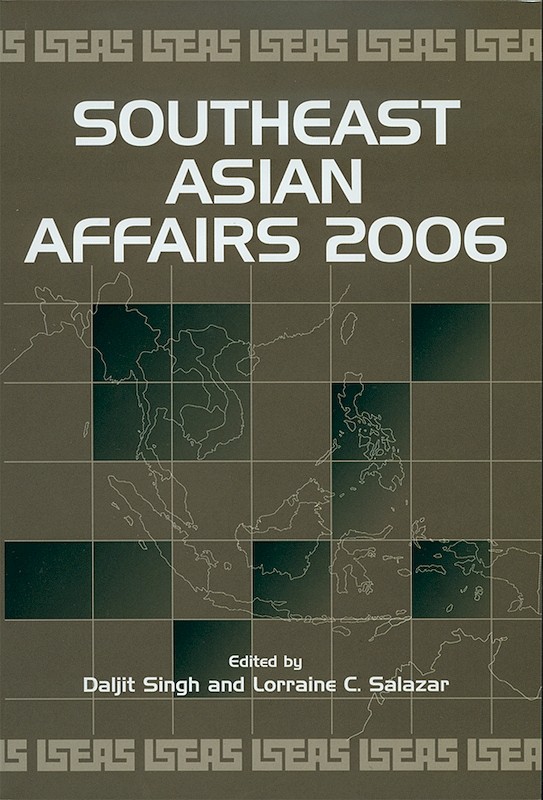Southeast Asian Affairs 1998
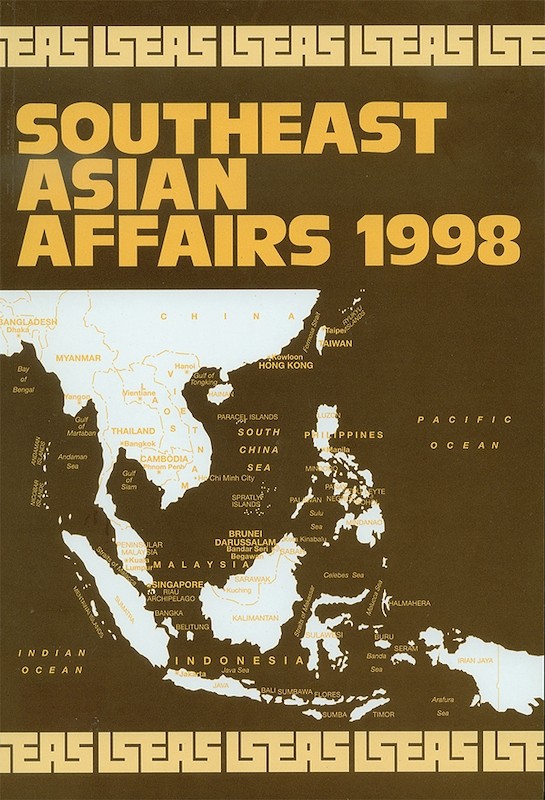
Date of publication:
1998
Publisher:
Institute of Southeast Asian Studies
Number of pages:
351
Code:
SEAA98
About the publication
Southeast Asian Affairs, of which there are now twenty-five in the series, is a review of significant developments and trends in the region, with particular emphasis on ASEAN countries. The publication aims primarily at giving the enquiring reader a broad grasp of current regional affairs. Readable and easily understood analyses are made of major political, economic, social, and strategic developments within Southeast Asia. The contributions can be divided into two broad categories. There are those which review and comment upon major developments during 1997 in individual Southeast Asian countries and in the region generally. Then there are the articles of more specialized current interest which deal with topical problems of concern in the individual Southeast Asian countries or the region as a whole.
Contents
-
Preliminary Pages
-
1. Southeast Asia: A Year When High Ambition Was Challenged see abstract1997 was a key year in ASEAN's adaptations to the post-Cold War environment. The Association was to enlarge its membership to all of Southeast Asia, deepen internal economic and political co-operation, enhance ASEAN's role in regional security affairs, and address important issues raised by the recent pell-mell growth of its members. The "Vision for ASEAN 2020" agenda for the year-end summit in Kuala Lumpur constituted a wide-ranging charter for consolidation and extension of the role of ASEAN and its members in the international system. However, significant difficulties converted what seemed a triumphal march into frustrated ambitions: uncertainties in major power relationships; admission of Myanmar was protested and of Cambodia postponed; and finally, economic "meltdown" spilled from Thailand throughout the region.
-
2. ASEAN Economic Co-operation: Adjusting to the Crisis
-
3. ASEAN: An Image Problem
-
4. East Asian Regionalism: So Close and Yet So Far see abstractASEAN has important roles to play as the East Asian countries overall need to increase their co-operation in both economic and security areas in the future. Discussions were held between the leaders of East and Southeast Asian economies in the second half of 1997 on ways to strengthen economic and trade ties between them amid similar trends in other parts of the world. The ongoing economic crisis has brought the Asian countries closer together than ever before. Apart from economic co-operation, they need to ponder on their security relations and work out a strategy that Asia can, to a certain degree, take care of its own security need. These efforts would also help boost the U.S.-anchored security consideration in the region.
-
5. Brunei Darussalam: Developing Within Its Own Paradigm see abstractThe article discusses the development process in Brunei Darussalam. As a Malay Muslim state, ruled by a monarch, and endowed with depletable resources of oil and gas, the country's slow and cautious development process raises some concern. It is clear that Brunei's development path has been within the ambit of Islamic principle. Thus, Islam has been the main thrust of the development strategy. The socio-political development episodes of 1997 are also highlighted. Realizing the importance of sustaining its development process, Brunei's long-term development policies should include the following: to improve domestic productivity and increase the participation of Bruneians in the economy; to restructure the economy by diversifying the productive base; and to devise more explicit human resource, industrial, and trade policies. Such policies require Brunei's involvement in regional co-operation and its active role in areas it has comparative and competitive advantages.
-
6. One Step Forward, Two Steps Back: Cambodia and the Elusive Quest for Peace see abstractFollowing the bloody developments of the weekend of 5 July 1997, Cambodia witnessed a return to state-sponsored violence, resurgent insurgency, the nullification of effective opposition inside the country, and pre-eminence of the rule of force over law. Cambodia is once again confronted with a battered economy, internal and cross-border population displacement, and international sanction and contestation over diplomatic representation at the United Nations. The ramifications of last summer's developments are grave and multi-dimensional, both in the immediate and the long term. The incipient steps taken so far towards national reconciliation and democratic pluralism have been gravely derailed by the destruction of oppositional political infrastructure and suppression of internal dissent. The most pressing concern, however, is the impact of these developments on the prospect for free and fair elections, scheduled for July 1998. Even if the elections were to take place as scheduled, post-coup conditions in Cambodia raise serious question about the possibility of a free and fair process and the overall prospect for democratization. The presence, even proliferation, of political parties, however, is not to be equated with political pluralism. At year's end, many questions are left unanswered namely (1) whether elections will be conducted as scheduled, (2) whether they will be meaningful in the immediate and long-term context of Cambodia's search for peace and democracy, (3) whether the electoral outcomes will be respected by all contending parties, and finally (4) whether international commitment to the principles enshrined in the Paris Agreements remains steadfast, if all else fails. The implications of these political setbacks, however, go beyond the matter of the elections. The persistent intrusion of politics hinders attempts both to rationalize the administrative apparatus, and to depoliticize and promote professionalism within the military and the judiciary. Political instability also deters the timely implementation of essential measures of administrative and economic restructuring and reform. Though presently subordinated to the security agenda, these reforms must be undertaken if Cambodia is to move beyond rehabilitation to sustainable development. Amidst resurgent instabilities, the country, still classified as one of the "severely indebted low income country", is stunted in its struggle towards sustained development and self-sufficiency . Despite notable growth rate over the last few years, a significant segment of the population, particularly women, the disabled, and the displaced, remain economically marginalized. Growth is also capital-city centric, whereby the periphery remains largely unaffected by the infusion of foreign aid. As long as political instability prevails, there can be no sustained efforts towards redressing the plaguing problems of corruption, poverty, inadequate health care, weak educational system, and overall social, economic, and political injustice.
-
7. Hun Sen's Pre-Emptive Coup: Causes and Consequences, by Sorpong Peou, contributor see abstractAfter two days' fighting in July 1997, forces loyal to Second Prime Minister Hun Sen pushed rival forces out of Phnom Penh and drove them to an enclave on the northern Thai-Cambodian border. The overthrow of First Prime Minister Ranariddh was a coup, not a social revolution or putsch. Unlike coups in many other countries, however, it was not caused by factors such as ethnic or ideological antagonisms. Hun Sen's actions must be explained in terms of his struggle for hegemonic preservation, as his party and adversaries prepared themselves for the next election.
-
8. Indonesia: A Year of Politics and Sadness, by Rizal Sukma, contributor
-
9. Indonesia: Towards Transition, by Bob Lowry, contributor see abstractPresident Soeharto has been endorsed for another term but such rituals do not alter the fundamental facts. The Soeharto succession is still inevitable and whoever replaces him will have to adjust Indonesia's outmoded political structures and practices to the economic and social changes that have swept the globe and Indonesia over the last thirty years. Whether Soeharto chooses to retire, is incapacitated, dies in office, or is ousted by the military is of little consequence, except for the elite. They will close ranks with the army to contain the amok which will almost inevitably accompany his demise as years of pent-up tensions and frustrations are vented. Then the elite will have to get down to the serious work of fundamental political reform which will provide the basis for the economic reforms currently under way. The article explores the challenges and obstacles they will encounter.
-
10. Laos: No Safe Haven from the Regional Tumult, by Nick J Freeman, contributor see abstract1997 was the year that Laos entered the Association of Southeast Asian Nations, and Vientiane persisted with a more outward-looking stance towards the global community. Unfortunately, Laos' gradual opening up coincided with a marked dip in the economic fortunes of Southeast Asia, and particularly Thailand, on which the land-locked country remains dependent. The small scale and youthful level of its economy may help Laos in weathering the economic storm that is tossing the surrounding region, although the country will certainly not be wholly immune. Notwithstanding the considerable progress made under the decade-long "New Economic Mechanism" reform programme, indicators suggest that the leadership remains somewhat ambivalent about enacting a coherent tranche of economic reform measures, preferring instead to adopt a gradualist approach. But a number of significant challenges lie ahead, including: making substantive progress in reducing Laos' worrisome trade deficit; weaning the country away from its dependence on external assistance; and attempting to construct a vibrant and sustainable domestic economy.
-
11. Malaysia: A Year of Introspection, by Bilson Kurus, contributor
-
12. Myanmar: Regional Relationships and Internal Concerns
-
13. Between Populism and Reform: Facing the Test of May 1998, by Alexander R Magno, contributor
-
14. Security Challenges of the Philippine Archipelago, by Aileen S P Baviera, contributor see abstractThe article takes a look at contemporary challenges to Philippine security, with special focus on the external dimension. The geographic setting and archipelagic nature of the country make the Philippines highly vulnerable to foreign intrusions and external threats. While it is the common perception that there is no immediate danger of major external aggression directed against the country in the short to medium term, it is also true that concern over regional instability and potential external threats has grown conspicuously over the last several years. Tensions are expected to continue over maritime areas and resources, including in the Spratlys, as the Philippines and neighbouring states strive to maximize their exclusive economic zones. The efficacy demonstrated thus far by Manila's bilateral and regional diplomacy will continue to be tested in the immediate future.
-
15. Entrenching a City-State's Dominant Party System, by N Ganesan, contributor see abstractThe article argues that the most significant developments in 1997 in Singapore pertain to the continued trend of administrative decentralization. The formation of Community Development Councils and the reintroduction of the mayoralty system clearly point towards decentralization. However, the appointment of People's Action Party (PAP) Members of Parliament as mayors and the linkage of the upgrading of public housing estates to voter support for the PAP has politicized administration and contributes to the entrenchment of a dominant party system. In foreign relations, bilateral ties with Japan and China were enhanced. The policy of constructive engagement with Myanmar continued to be problematic and relations with Malaysia nosedived to a new low.
-
16. Towards a Singaporean Civil Society, by Simon Tay, contributor see abstractObservers of Singapore frequently struggle to locate the focus of politics in the city-state. In the 1970s, some considered politics to be the domain of the bureaucracy. Into the 1980s and 1990s, others predicted the rise of liberal democracy and political opposition. The article suggests that in the coming future the main arena of political contest for Singapore will be civil society. Civil society is often seen as being in opposition to the state. Yet in Singapore, government statements have encouraged the growth of civil society. The article traces the intersection between citizens' efforts towards civil society and the government's reasons for encouraging that growth. The article suggests that Singaporean civil society may evolve to be independent of the state, but not necessarily in opposition to it.
-
17. Thailand: Constitutional Reform Amidst Economic Crisis, by Prudhisan Jumbala, contributor see abstractThe chapter reviews Thai politics during 1997, concentrating on three issues: the Assembly of the Poor's encampment, the movement for political reform, and the politics of the financial crisis. It sees the Assembly's ability to organize a country-wide horizontal network and its advocacy of policy and legislative changes and of greater public participation in decision-making, as notable and historic. The new 1997 Constitution, distinctive in the unprecedented extent of public involvement in the drafting process, is reviewed for its democratic and reformist content. The financial crisis facilitated the Constitution's passage through Parliament and took its toll on the Chavalit Administration Parliamentary methods ushered in the Chuan government. In conclusion, 1997 was an unprecedented year, where crisis gave rise to opportunities, indicating a maturing democracy.
-
18. Thai Foreign Policy: Seeking Influence, by John Funston, contributor see abstractThe 1980s, according to Thai leaders and foreign policy analysts, was a golden age of foreign policy, with Thailand assuming a leadership role within ASEAN. In the 1990s, frequent changes of government and foreign minister allowed other countries to take over this role. But moments of inspired leadership, particularly by governments led by Anand Panyarachun, favourable post-Cold War circumstances, and foreign ministry professionalism, did keep Thailand at the forefront of regional diplomacy in the 1990s. Recent governments have strengthened regional ties further, though the new Chuan administration, forced by the financial crisis to seek greater United States support, has returned Thailand to a more traditional path of balancing regional and great power interests.
-
19. Vietnam's One-Party Rule and Socialist Democracy?, by Thaveeporn Vasavakul, contributor see abstractThis article discusses leadership changes in the National Assembly, the cabinet government and the Politburo of the Vietnamese Communist Party, as well as the leadership's strategy towards the rebuilding of a post-central planning political and economic order within the context of mounting domestic social unrest, especially in Thai Binh, and the financial crisis throughout Southeast Asia. It observes that changes in the leadership in 1997 indicated that "apex" politics continued to reflect sectoral politics whereby the army, the state, and the ideological work sectors were prominent actors, although the process of leadership change itself has departed from the previous pattern in several ways. It discusses the Third Plenum of the Central Committee's focus on the promotion of "socialist democracy" as a means to cope with rampant corruption by party and state officials and the Fourth Plenum's focus on the mobilization of internal capital to cope with rising domestic economic problems.
-
20. Striving Towards Doi Moi II, by David H D Truong, contributor see abstractFollowing a six-year period of market economic reforms, Vietnam is facing mounting challenges that could herald the beginning of another socio-economic crisis, if not resolutely confronted. The 1989-95 period, which marked the height of socio-economic reforms since the launching of doi moi (renovation) in 1986, witnessed an average annual growth of gross domestic product of 7.8 per cent; a developing multi-sector (mixed) economy; and a significant opening to international markets. This period also saw Vietnam's political re-integration into the world community, punctuated by the normalization of relations with the United States (1994-95), its entry into the Association of Southeast Asian Nations in July 1995, and a growing participation in regional and international organizations. At the same time, it enjoyed an expansion of official aid flows to underpin the country's restructuring and development processes. This article explores a key question: given the rising number of challenges that are currently not being addressed, will Vietnam's leadership be able to sustain the country's socio-economic performance for the remaining years in this century? Although the recent Southeast Asian currency crisis has had minimal effect on Vietnam, due to its relatively closed and underdeveloped financial structure, the ensuing slowdown in East Asia is likely to highlight Vietnam's problems of competitiveness and restructuring as it integrates further into the world economy. However, it remains an open question as to whether the party-state leaders will be able to muster the needed support and the will to manage a formidable array of challenges and overcome them.

